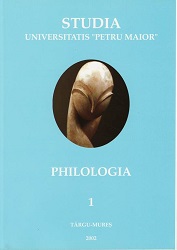The unliterariness and its transgressive feature. On poetry as an ideological form
The unliterariness and its transgressive feature. On poetry as an ideological form
Author(s): Ramona-Gabriela HosuSubject(s): Language and Literature Studies
Published by: Editura Universităţii Petru Maior
Keywords: the thirties in America: political; social; economical; cultural life;
Summary/Abstract: Over interpretation is a familiar outcome both of anxiety and of hermeneutics and it is necessary to those brooding on cultural change. The culturalist temptation is a spontaneous effect of current theoretical preferences. However old fashioned it may be, cultural politics embodies a sort of transgression from the ‘cultural’ to the ‘political’, or from the ‘political’ to the ‘cultural’, and this is the very core of any society encountering transition, partial or radical change. Culture is what hesitates before politics, resists it, in the name of values that transcend the ordinary interests and antagonisms of social life, i.e. culture is in itself already political. Culture remains the necessary element of politics whose means are often strictly cultural. This sounds very Marxist, and it might be monstrous for the people that thought of it as the initiating point of socialism, further more, of communism, and eventually of dictatorship. But it is Paul Ricoeur who said in his Essays on Hermeneutics that “We need today a free thinking which is opposed to any operation of intimidation exercised by some people against the others, a kind of thinking that has the imprudence and the ability of intersecting Marx, without following or combating him.” (Ricoeur, p. 205 )
Journal: Studia Universitatis Petru Maior. Philologia
- Issue Year: 2002
- Issue No: 01
- Page Range: 102-106
- Page Count: 5
- Language: English

